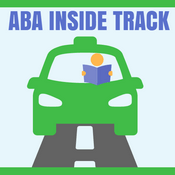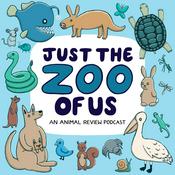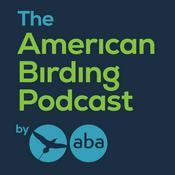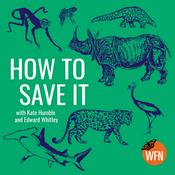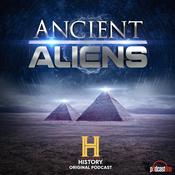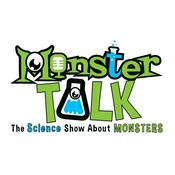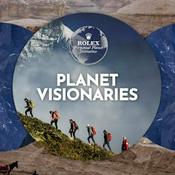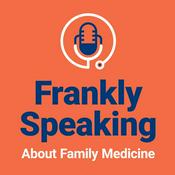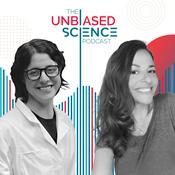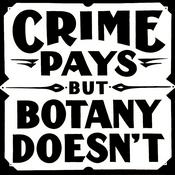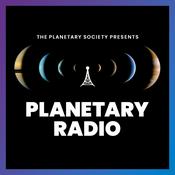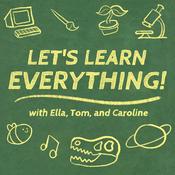23 episodes
Ep. 20 Bonus: An Interview with Clay Jenkinson (unfiltered) aka Thomas Jefferson
12/15/2025 | 45 mins.Title: Languaging in Hampton Roads
Episode 20 Bonus: Interview with Clay Jenkinson (unfiltered) on being Thomas Jefferson
Hosts: Jill Winkowski and Prue Salasky
Date: Dec. 15, 2025
Length: 45 minutes
Publication Frequency: Monthly (approx)
In this bonus episode, we talk to Clay Jenkinson, humanities scholar and longtime host of The Thomas Jefferson Hour (now Talking with America, ltamerica.org ) on National Public Radio, about how he portrays the nation’s 3rd president and author of the Declaration of Independence.
In a 90-minute interview, edited to 45 minutes, Jenkinson describes both his vast admiration for Jefferson, his political ideas and his writings, and the impossibility of reconciling the Founding Father’s words about liberty and equality with the fact that he owned 600 slaves over his lifetime.
The hypocrisy and inherent conflict is one reason that Jenkinson finds the character interesting. He has studied and portrayed Jefferson for more than 40 years. He notes that the Virginian who had a 34-year affair with one of his slaves, Sally Hemings, maintained a wall of silence about slavery that his friends and political contemporaries never challenged.
Other conflicted characters that Jenkinson portrays include Meriwether Lewis, Robert J. Oppenheimer, and John Steinbeck.
Jenkinson explains the 3-part Chautauquan method he developed in the 1970s to interpret historical figures: an unscripted monologue, followed by a Q and A in character, followed by breaking character and speaking as himself.
Three years ago, as Jefferson became increasingly persona non grata with the public, Jenkinson changed the title of his show to Talking to America. He talks of the necessity but also his regret and his belief in the “whole person” approach – and mostly he believes that people today have a lot to learn from Jefferson. He dubs himself a Jeffersonian and expresses deep concern about the current political climate in the U.S. Jenkinson is the director of The Dakota Institute and is teaching courses on the U.S. Constitution and the fall of the Roman Republic.
For more on Jenkinson and his use of 18th century language in his interpretation of Thomas Jefferson, listen to Ep. 20: Talk like a Revolutionary! Be Polite! https://podcasts.apple.com/us/podcast/languaginghr/id1727246364?i=1000734616760
Send us feedback and questions at [email protected]; and for more information and to access all our past episodes, check out our website at languagingHR.wordpress.com
LanguagingHR is available free on Spotify, Apple Podcasts, and iHeartRadio. Don’t forget to like, follow, and subscribe!- Title: Languaging in Hampton Roads
Episode 20: How to Talk Like a Revolutionary: Be polite!
Hosts: Jill Winkowski and Prue Salasky
Date: Oct. 31, 2025
Length: 43 minutes
Publication Frequency: Fourth Friday (approx) of each month
Colonial Williamsburg, the restored Colonial capital (until 1780) of Virginia lies at the northwestern edge of Hampton Roads, part of a historic triangle with Yorktown and Jamestown. Since it opened as “the world’s largest U.S. history museum” in the 1930s, it has been telling the story of the Founding Fathers and the American Revolution. To learn about all its tours, programs, activities and educational programs, go to www.colonialwilliamsburg.org.
In this episode we explore how CW’s use of 18th century language contributes to understanding the men and women who drove revolutionary change in the turbulent years before and after the American Revolution. We learn about the distinctive features of speech at the time of the Declaration of Independence, whose 250th anniversary is next year, 2026.
We talk to Cathleene Hellier, senior historian at the Colonial Williamsburg Foundation, who authored the book, “18th Century English as a Second Language” (2011, out of print; available online at https://play.google.com/store/books/details/Eighteenth_Century_English_as_a_Second_Language?id=V0N3CAAAQBAJ&hl=en_US&pli=1. )
She discusses the hundreds of primary sources she used to understand how language has changed over the past 250 years and its significance.
We shared the book with humanities scholar Clay Jenkinson, host of Listening to America (formerly The Thomas Jefferson Hour) on NPR, https://ltamerica.org/
and the country’s best-known Thomas Jefferson impersonator. He details the textbook’s relevant points and describes his own literature-based method of conveying the thoughts of the nation’s third president.
CW’s Nation Builders program offers first-person interpretations of 18th century Virginians, both the well-known, such as Thomas Jefferson and George Washington, and the lesser-known, including a preacher, a teacher, and a barkeep, all of whose lives impacted the community.
We attended a Nation Builders performance at the Kimball Theatre, with Stephen Seals portraying James (Armistead) Lafayette, a formerly enslaved African-American who earned his freedom for his spying services for the Patriots during the Revolutionary War; and Robert Weathers, who represents George Wythe, a jurist, scholar, and signer of the Declaration of Independence.
Hellier addresses the difficulties in portraying African-American history in the Colonial period and details the extensive research she’s done into the language varieties of the time. She’s a contributor to enslaved.org, a database of information regarding enslaved people worldwide. She touts the importance of the Virginia Gazette newspaper as a source (digitized copies are available on the CW website, www.colonialwilliamsburg.org.) We’re reminded too of the newspaper resources collected by the Library of Virginia, https://www.lva.virginia.gov/collections/digital-collections
And the Valentine Museum in Richmond has a rich repository of African-American history, https://thevalentine.org/
Check out our website, languagingHR.wordpress.com. Send your feedback and questions to [email protected]. Visit us on facebook and Instagram, and be sure to like, follow, review! Thanks for listening! - Title: Languaging in Hampton Roads
Episode 19: The Myth of Standard English: 3 profs talk about how language works
Hosts: Jill Winkowski and Prue Salasky
Date: September 6, 2025
Length: 46 minutes
Publication Frequency: Fourth Friday (approx) of each month
What exactly is linguistics? Quite simply, linguistics is the study of language, not the study of one particular language, but language as a whole. So, when we talk about Applied Linguistics, we’re talking about how linguistic theory translates to practice, whether teaching TESOL or a foreign language to English speakers, understanding language variations and dialects, recognizing the bias and power inherent in standardized or normative language, or how language changes and what that tells us about history, culture and identity.
For this episode, we returned to interviews we conducted over the past 18 months with three linguists at Old Dominion University (ODU) in Hampton Roads to learn just how linguistics applies in so many aspects of life. And particularly about the standard English bias and its effects. Each professor talks about her linguistic path, her specialty and the broad reach of the field.
We revisited our Jan. 2025 talk with sociolinguist Dr. Bridget Anderson, director of the Tidewater Voices oral history archive at Old Dominion University, a collection of local dialects gathered over more than 20 years, https://digitalcommons.odu.edu/tidewatervoices/. Anderson is an expert in acoustic phonetics and language variation.
We also pulled from our spring 2025 conversation with professor emeritus Dr. Janet Bing, a phonologist, and a driving force behind the establishment of the university’s Applied Linguistics masters program (the only one in the region), and teacher of teachers of TESOL (Teachers of English to Speakers of Other Languages).
And we returned to our dialogue with Dr. Staci Defibaugh, graduate program director of the Applied Linguistics program at ODU, whose research focuses on discourse analysis of speech in health settings.
In this episode we discover the shared features of linguistic discovery and what it can teach us about social standing, bias, and much more.
In our earlier episodes (see below), we drew on their specific areas of expertise.
Ep. #13 Guinea Talk: Gloucester County’s Unique Dialect https://podcasts.apple.com/us/podcast/languaginghr/id1727246364?i=1000688235981,
Ep. #16 How do you say Norfolk? https://podcasts.apple.com/us/podcast/languaginghr/id1727246364?i=1000706264104, and
Ep. #4 How are you doing? Diagnosing Health Talk
https://podcasts.apple.com/us/podcast/languaginghr/id1727246364?i=1000654121382,
Here are links to the Great Vowel Shift and the IPA vowel chart for American English, as discussed by Dr. Anderson
https://www.icloud.com/iclouddrive/021dYoM3E3G2qxJg0p5VlIoRg#IPA_chart_for_American_English
http://eweb.furman.edu/~mmenzer/gvs/what.htm
Send your feedback and questions to [email protected], and be sure to visit our website, www.languaginghr.wordpress.com - Title: Languaging in Hampton Roads
Episode 18: Williamsburg Poet Laureate talks character, community and spitting bars
Hosts: Jill Winkowski and Prue Salasky
Date: July 18, 2025
Length: 36 minutes
Publication Frequency: Fourth Friday (approx) of each month
In this episode, a follow to Ep. 6 (June 2024) we catch up with Lacroy “Atlas” Nixon, a spoken word artist, slam performer and founder of the nonprofit Slam Connection. He’s the newly named inaugural poet laureate of Williamsburg, Va.
In Ep. 6: Creative Community: Spoken Word in Hampton Roads, published a year ago in June 2024, we featured interviews with three of the region’s spoken word performers, Tanya Cunningham, George Mendez, and Nixon to showcase the genre and the local community.
Since then, Nixon has been named poet laureate for the City of Williamsburg. In this interview, (recorded on June 29, 2025, and lightly edited) we spoke to him about his new role which officially started this month. In it, he explains the process of becoming a poet laureate and says that the emphasis of his two-year post will be on engaging the area’s youth.
Much of his work will involve pursuing partnerships with existing organizations, such as:
Slam Connection, (https://slamconnection.my.canva.site)
established by Nixon in 2022, has a mission of encouraging self-expression, healthy discourse and spitting bars (a term explained in Nixon’s interview), and empowering youth through spoken word poetry. It hosts open mic nights, slam contests, and writing events. It also involves a strong service component.
2. The Ampersand International Arts Festival, www.ampersandfestival.com, an annual arts festival held in Williamsburg in March, “is part of the CIty of Williamsburg’s initiatives to support town and gown collaboration between the City, the College of William and Mary, Colonial Williamsburg, and partners.”
3. 2nd Sundays, Williamsburg’s Art & Music Festival, https://2ndsundayswilliamsburg.com
4. The Poetry Society of Virginia, https://poetrysocietyofvirginia.org; a 100-year-old nonprofit dedicated to cultivating the writing and enjoyment of poetry.
5. Writers Guild of Virginia, https://www.writersguildva.com; Nixon is a board member of the nonprofit that offers classes, workshops and events for writers.
In the interview, Nixon references first Friday open mic nights at Column15 Cafe and Roastery, 701 Merrimac Trail R, Williamsburg; www.column15.com; and slam competitions at the Kimball Theatre, Duke of Gloucester Street, www.colonialwilliamsburg.org.
He also credits the location Bazaaro’s Deli in the Williamsburg Premium Outlets, 63A 5715 Richmond Rd, Williamsburg, www.bazaaros.com for hosting slam contests.
He also talks about competing in Southern Fried,www.southernfriedpoetryslam.com, one of the largest spoken word and performance poetry tournaments in the world. The event is held annually in a southern US city in the first week of June. Nixon’s team placed sixth in the 2025 competition in Knoxville, Tenn.
Send your feedback, comments and questions to [email protected]. Also, check out our newly updated website, languaginghr.wordpress.com and engage with us on Facebook and Instagram. Thanks to our summer interns, Kaitlyn Asato of Christopher Newport University and Sarah Phillips of Old Dominion University, for their work on the website and social media respectively. - Title: Languaging in Hampton Roads
Episode 17: Third Culture Kids
Hosts: Jill Winkowski and Prue Salasky
Date: June 13, 2025
Length: 26:10
In this episode of Languaging in Hampton Roads, co-hosts Jill Winkowski and Prue Salasky talk with Molly Dye (Williamsburg/Richmond), Jody Conibear Tangredi (Virginia Beach), and Sina Whitley (Newport News) about their experiences growing up globally as Third Culture Kids.
The term third culture kid (TCK) was coined by sociologist Ruth Useem in the 1950s, while she was studying the lives of Americans living and working in post-colonial India. While Useem was studying the cultural intersection of the professional lives of Indians and Americans, she noticed the unique situations of the children accompanying parents abroad.
Third culture kid experiences vary but, commonly, they grow up outside of their parents’ passport countries. Molly’s father worked for the U.S. State Department and her family lived in Switzerland and Spain; Sina’s parents taught for U.S. Department of Defense schools and her family lived in Cuba, Spain, England, and Japan; Jody’s father worked for the oil industry, and she lived in Iran, Indonesia, Australia, and Singapore.
Living in multiple countries as a child offers adventure and excitement. It also provides a way to experience different cultures and viewpoints during important formative years. Third culture kids can become very adaptable and commonly learn to understand many points of view. Jody, who not only is a third culture kid, but has also studied them, describes how TCK adaptability and ability to understand others' viewpoints makes them highly suitable for international careers.
While growing up as a TCK has its up sides, the loss that TCKs experience over the years often goes unacknowledged. Moving from place to place, repeatedly saying goodbye to friends and having to make new ones and having to readjust to new languages, cultures, and systems can add up. TCKs don’t always have permission or time to grieve their losses.
Here in Hampton Roads, with one of the largest military communities in the United States and with multiple international organizations and industries, including an international port, the third culture kid childhood likely hits home. Third culture experiences aren’t exclusive to moving from country to country. Children who move state to state with their parents’ jobs also have to adjust to new cultural systems and to different ways of interacting and speaking.
In this episode, we refer to a book: Third Culture Kids: Growing Up Among Worlds, by Ruth D van Reken, David C. Pollock, and Michael V. Pollock, Published: Nicholas Brealey America, 2009.
Send feedback, questions, ideas for topics to [email protected]
We are grateful to Carlene Klein-Bennett, who researched the topic and developed a questionnaire for and reachedout to local TCKs.
Welcome to our summer interns: Sarah Phillips from ODU andKaitlyn Asato from CNU.
Original music is by Skye Zentz; Our Languaging logo is byPatty McDonald.
Languaging in Hampton Roads is written and produced by Prue Salasky and Jill Winkowski.
More Science podcasts
Trending Science podcasts
About languagingHR
A monthly podcast in which Jill Winkowski and Prue Salasky explore life and language in Hampton Roads, Virginia.
Podcast websiteListen to languagingHR, The Rest Is Science and many other podcasts from around the world with the radio.net app
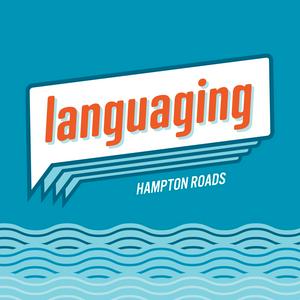
Get the free radio.net app
- Stations and podcasts to bookmark
- Stream via Wi-Fi or Bluetooth
- Supports Carplay & Android Auto
- Many other app features
Get the free radio.net app
- Stations and podcasts to bookmark
- Stream via Wi-Fi or Bluetooth
- Supports Carplay & Android Auto
- Many other app features


languagingHR
Scan code,
download the app,
start listening.
download the app,
start listening.



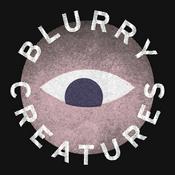











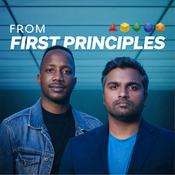

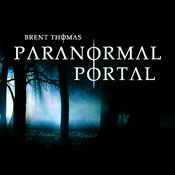
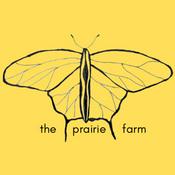
![Podcast Cosmosis [Formerly The UFO Rabbit Hole]](https://www.radio.net/podcast-images/175/the-ufo-rabbit-hole-podcast.jpeg?version=c4cfeed14331265219e0263fd62be755644a8cf4)




